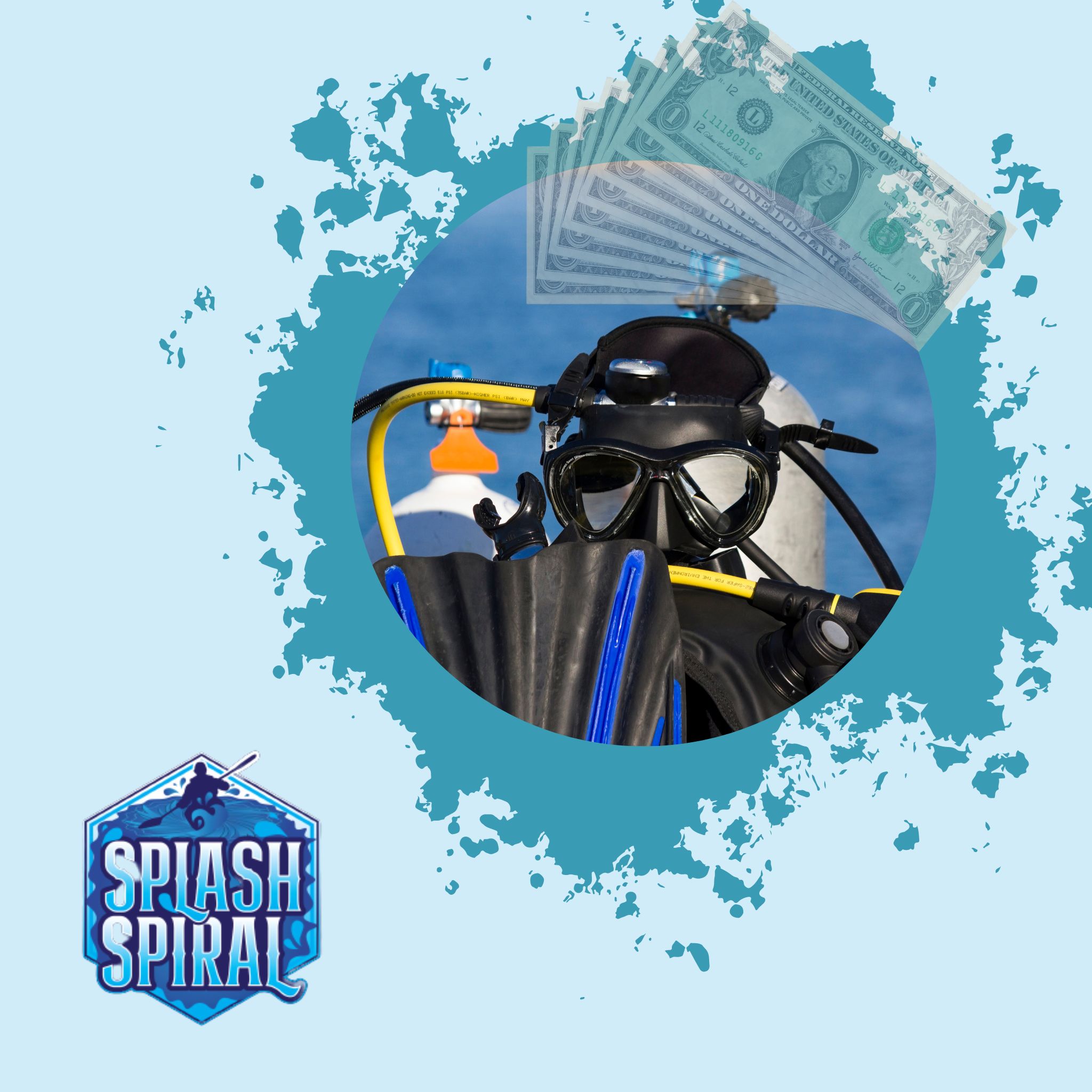
Scuba diving is an amazing underwater adventure that has captured the hearts of many water enthusiasts. It involves using specialized equipment to breathe underwater and explore the marine world.
Scuba diving is not only a recreational activity but also a profession for many individuals. However, scuba diving can be an expensive hobby and requires careful budgeting to enjoy fully.
Definition of Scuba Diving
Scuba diving is an underwater activity that involves using a self-contained underwater breathing apparatus (SCUBA) to breathe air from a tank while exploring the underwater world. The sport originated in the 1940s when Jacques Cousteau and Emile Gagnan invented the first successful scuba device. Scuba diving gives individuals the opportunity to explore coral reefs, shipwrecks, and other underwater habitats that would not be possible without this technology.
The Importance of Knowing the Cost of Scuba Diving
Before embarking on any new hobby or activity, it is essential to know how much it will cost as part of your financial planning process. Scuba diving can be an expensive hobby due to its equipment requirements, training costs, travel expenses, and site fees.
Knowing how much you need to save or budget for can help you plan accordingly and avoid any unwanted financial surprises. Furthermore, understanding the cost of scuba diving will also help you make informed decisions about which type of scuba certification course or equipment purchases are best suited for your level of interest or experience in scuba diving.
Overview of Factors That Affect The Cost
There are many factors that contribute to the overall cost of scuba diving such as certification courses, equipment rentals or purchases, dive site fees/travel expenses, and additional activities like boat charters or night dives. Certification courses are required before anyone can begin their journey into the depths of the sea.
You’ll need to consider not only the cost of the certification course but also any additional training courses you may want to take up in the future. Equipment rentals or purchases vary depending on what is required for your dive experience.
The basic equipment consists of a mask, fins, and snorkel while scuba gear includes a BCD (buoyancy control device), regulator, and dive computer. Dive site fees and travel expenses can also add up quickly as scuba diving is often done in exotic locations or remote areas.
Knowing where you want to dive will help give you an idea of how much it will cost to get there. Additionally, some popular destinations require prepayment for their services which can make budgeting even more critical.
Overall, understanding the costs involved in scuba diving is essential before starting this exciting adventure sport. By planning ahead and knowing what factors contribute to these costs, you’ll be able to enjoy your underwater journey without any financial worries or surprises.
Factors that Affect Scuba Diving Cost
Certification and Training Costs
Before embarking on a scuba diving adventure, it is essential to undergo training and certification. The cost of certification varies depending on the level of certification, and the number of certifications one wishes to obtain.
The Open Water Diver course is the most basic level of scuba diving certification, costing an average of $400-$500. It includes classroom sessions, pool training, and an open water dive.
For those who want to advance their skills, there is the Advanced Open Water Diver course that costs about $300-$400. This course focuses on advanced diving techniques such as underwater navigation and deep diving.
Rescue Diver Course comes next with a cost range of $350-$500 that teaches how to handle emergency situations while diving. For those who want to become professional divers, there is the Dive Master Course that costs around $800-$1,000.
Equipment Rental and Purchase Costs
Scuba diving equipment can be rented or purchased outright. Basic equipment such as masks, fins, snorkels cost around $100-$200 when purchased new but can be rented at a lower price if needed only for a short duration.
Scuba gear such as BCD (Buoyancy Control Device), regulator set and dive computer are also necessary for scuba diving but can be quite expensive when bought altogether – up to $1,500 or more depending on quality brands. It’s important for divers in colder water conditions or deeper dives to invest in wetsuits or drysuits which range from $200 – $1,000 depending on thicknesses suited for your desired temperatures.
Dive Site Fees and Travel Expenses
The cost of scuba diving varies greatly based on local dive sites versus international destinations; each has its own unique experiences. Local dive sites are cheaper, and one can find many affordable options that cost around $50-$100 per dive.
On the other hand, international dive destinations tend to be more expensive, but offer the opportunity for an unforgettable dive experience that may be well worth the extra expense. Travel expenses should also be taken into consideration when planning a scuba diving trip.
Round-trip flights, transportation costs, and accommodation expenses can add up quickly and should be factored in when budgeting for a scuba diving trip. Overall, scuba diving is an expensive activity that requires proper budgeting before embarking on the adventure.
Cost Breakdown for Scuba Diving in Popular Destinations
The Caribbean Islands
The Caribbean is one of the most popular destinations for scuba diving. The crystal-clear waters, vibrant coral reefs, and diverse marine life make it an unforgettable experience. In the Bahamas, a single tank dive can cost between $60-$100, while a two-tank dive will be around $100-$150.
The cost can vary based on location and if you bring your own equipment or rent it on site. In the Cayman Islands, expect to pay around $100 per one-tank dive or $160 for two tanks.
However, some of the more popular sites may have additional fees. For example, diving at Stingray City will add another $25-40 to your total cost.
Aruba offers stunning marine life encounters as well as wreck dives. Prices range from about $60-$90 per one-tank dive and about $85-$120 for two tanks.
Asia-Pacific Region
The Asia-Pacific region offers some of the most affordable scuba diving options but also includes some luxurious experiences that come with a higher price tag. In the Philippines, a single tank dive is about $30-$50 while a two-tank dive can range from $50-90 depending on location and amenities offered by your operator. Thailand offers extremely affordable pricing with single tank dives costing between $30-$50 and two-tank dives ranging from 55-80 dollars.
Although these prices are low compared to other destinations, Thailand has remarkable underwater landscapes where you can encounter whale sharks and other large marine animals that cannot be seen anywhere else in the world. Australia is known as one of the best diving destinations globally due to its varied aquatic life; however, it comes with a higher cost.
In Australia, the price range is between $100-$200 per one-tank dive and $200-$350 per two tanks dive. These prices are subject to change depending on the location of your diving experience.
How to Save Money on Scuba Diving
1. Buy Your Own GearOne of the most effective ways to save money on scuba diving is by investing in your own gear. Although it may seem like a considerable expense upfront, buying your own gear and equipment can save you hundreds of dollars in rental fees in the long run. Moreover, owning your scuba gear means that you will be using equipment that is well-maintained and familiar to you, thereby increasing comfort levels and enjoyment during dives.
2. Dive LocallyDiving locally may not offer the same level of excitement as traveling abroad, but it can certainly help cut back on expenses associated with airfare and accommodation costs. Furthermore, diving locally frequently allows divers to establish relationships with local operators who may offer discounts or loyalty programs for repeat customers.
3. Look for Discounts and Special OffersWhen planning a trip or booking a dive excursion, it always pays off to keep an eye out for discounts or special offers that may be available from tour operators or resorts. Websites like Groupon and LivingSocial often feature deals on scuba diving packages, which can save you a considerable sum of money.
Conclusion
Scuba diving has long been considered an expensive sport reserved only for the wealthy elite; however, this need not be the case anymore. By implementing some of the tips outlined above – buying your own equipment, diving locally more often than traveling internationally, and searching out promotional deals – you can substantially reduce your overall cost while ensuring that you still get all the benefits of exploring underwater reefs and marine life around the world! Remember: with proper planning and research, scuba diving remains one of the most accessible forms of adventure travel available today!







